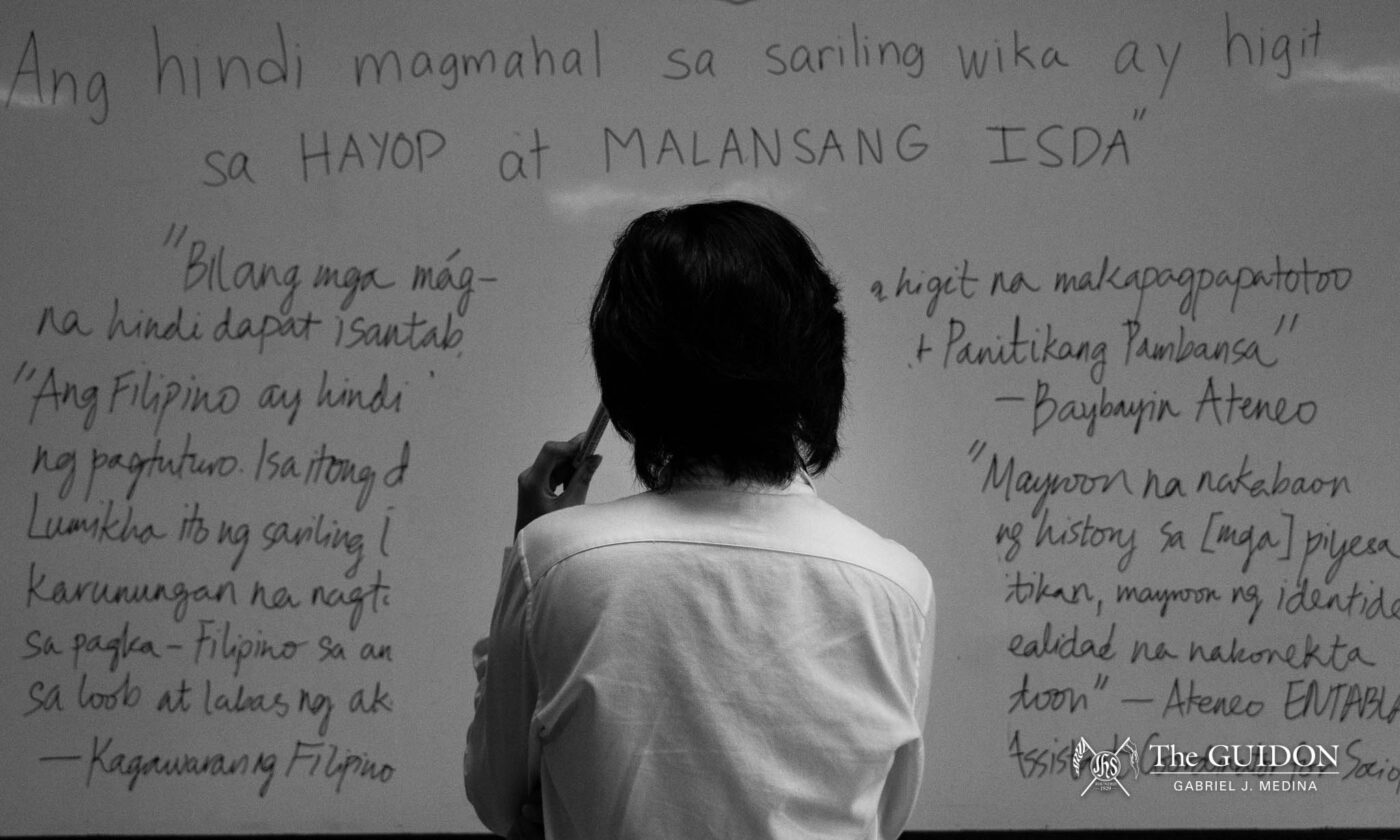MEMBERS OF the Loyola Schools (LS) community have expressed their opposition towards the Supreme Court’s (SC) unanimous revocation of the Temporary Restraining Order (TRO) on the Commission on Higher Education (CHED) Memorandum Order No. 20, series of 2013 excluding Filipino and Panitikan among the required General Education subjects in the order’s revised core curriculum for colleges.
The Filipino Department, along with student organizations Ateneo Enterteynment para sa Tao, Bayan, Lansangan at Diyos (ENTABLADO) and Baybayin Ateneo released statements online in response to SC’s decision.
The Filipino Department conveyed their criticisms against the decision, saying that it is rooted in an incorrect understanding of the study and teaching of Filipino on a tertiary level.
“Ang Filipino sa antas na tersiyaryo ay hindi pag-uulit ng Filipino sa mataas na paaralan. Sa halip, pagpapalawig ito ng mga batayang kasanayan na natutuhan ng mga mag-aaral sa mga nauna nilang pag-aaral,” the statement read.
(Filipino in the tertiary level is not just a repetition of Filipino in high school. Instead, it is an extension of the basic skills learned by students in their prior studies.)
Meanwhile, ENTABLADO voiced out that they oppose the order, saying in Filipino that they believe its implementation is “not the right solution,” since it was drafted with the assumption that the K-12 system is “perfect.”
For Baybayin Ateneo, the organization opined that the order indicates CHED’s “lack of value for the Filipino language, culture, and identity.”
SC explains ruling on TRO
In CHED’s official response to the SC’s lifting of the TRO, Chairman Prospero de Vera III, PhD stated that CHED is awaiting the SC’s final decision on the implementation of Memorandum Order No. 20. According to him, CHED also respects the choice of groups opposed to the SC ruling to file motions for reconsideration.
Memorandum Order No. 20 provided a framework and rationale for a revised General Education (GE) curriculum following the implementation of the K-12 program. The order shows that the curriculum was revised in light of the development of the K-12 education curriculum, which follows the Technical Education and Skills Development Authority’s college and work-ready standards.
The SC unanimously lifted the TRO on October 9 to avoid duplicating subjects in the required GE curriculums for grades 1 to 10, senior high school, and college levels.
In the SC’s ponencia on the decision, the Court added that Higher Education Institutions (HEIs) and schools that award academic degrees may still require additional Filipino and Panitikan courses if they wish to.
National implications
Filipino professor Michael Coroza, PhD clarified the possible consequences of SC’s proposal in an interview with The GUIDON.
“Ang pinakamalaking problema kung national level ang pag-uusapan—national symbol at national sagisag ng pagkataong Filipino, at instrumento ng pagkatuto ng Filipino at ang pagka-Filipino ng Filipino ang binabalewala,” Coroza said.
(The biggest problem, when discussed on a national level—the national symbol of the Filipino, the instrument for teaching Filipino, and the essence of being Filipino is what’s being made to have no value.)
Filipino Department Chair Gary Devilles, PhD also weighed in on the issue, discussing how CHED’s proposal may lead universities to settle with the minimum amount of units required by CHED.
“That’s the mentality, an easy way out. Rather than build their literature program or literature department — Why [do so]?” he stated.
He noted that “nothing is actually stopping [other universities]” from no longer including Filipino classes.
Meanwhile, Ateneo ENTABLADO Assistant Coordinator for Sociopolitical Concerns Nicole Garcia expressed that on a national level, the CHED order would contribute to molding students’ thinking in a Western context.
“Maaaring maging problema kasi magkaiba talaga ang [kaisipang] kanluranin. May pamantayang kanluranin na hindi mo pwede ma-apply directly sa konteksto ng Pilipinas,” she said.
(This can be a problem since Western [thinking] is really different. There are Western standards that you cannot directly apply to the context of the Philippines.)
Effect on the University
Devilles also mentioned that even if the proposal were to be fully implemented, Ateneo would not be “totally affected” by it, as the University is considered to be an HEI.
Meanwhile, Baybayin Ateneo President Ruby Descalzo explained that CHED’s proposal may negatively affect how students view the Filipino language.
“[If classes] stop at a high school level, as [students] grow up hindi [nila] ma-appreciate [ang wika], hindi [nila] maibigan ng sariling wika, which is reflective of our ideas as Filipinos,” she said.
([If classes] stop at a high school level, as [students] grow up they will not be able to appreciate [the language], they will not be able love their own language, which is reflective of our ideas of Filipinos.)
Appealing to the SC’s decision
Devilles, fellow Filipino professor Alvin Yapan, PhD, and members of Baybayin Ateneo attended a public consultation on the matter. It was hosted by government body Komisyon sa Wikang Filipino (KWF) on November 16 at the commission’s headquarters in Manila.
120 attendees of the consultation signed a statement supporting a motion of reconsideration for the SC’s decision to revoke the TRO on CHED Memorandum No. 20.
Devilles said that the Filipino Department is affiliated with the KWF. According to him, members of the department helped draft the KWF’s statement, which included all memoranda issued by the KWF to CHED about the use of language and the use of literature.
These memoranda include Commission Resolution No. 15-28, series of 2015, to strengthen the National Program for the Intellectualization of Filipino and Commission Resolution No. 15-37, series of 2015, to strengthen Filipino as a Language of Higher Education.
Devilles noted that the documents included in the statement “prove the legality of literature and language courses.”







